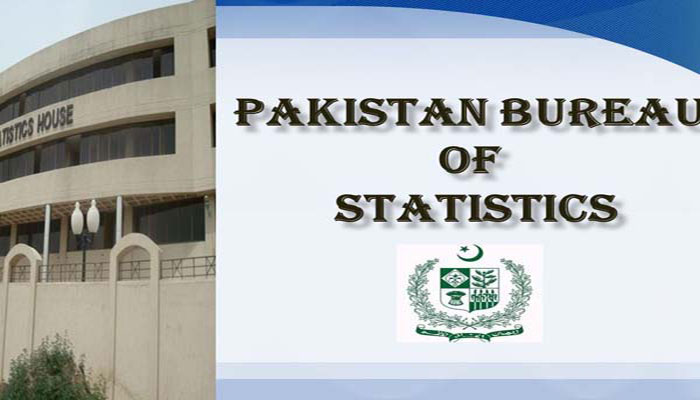Livelihood of 20.7m people affected by lockdown: PBS
ISLAMABAD: A survey by the Pakistan Bureau of Statistics (PBS) on well-being after COVID-19 pandemic shows that due to lockdown and closure of economic activities, 20.76 million population was affected in Pakistan.
That followed speedy recovery because the government did not opt for strict lockdowns.
Federal Minister for Planning Development and Special Initiatives, Asad Umar, visited the PBS and chaired a meeting on the initiative taken by it to design a decision support system for inflation and the results of special survey to evaluate the impact of Covid-19 on well-being of people, here in Islamabad, on Thursday.
The meeting was attended by the members and senior officers of PBS.
In the survey, information related to employment, income, remittances, food insecurity, health, coping strategies adopted by the households and assets to compile wealth quintiles was collected. The survey results reveal that in Pakistan, 35 percent population, 10 years and older, i.e. approximately 55.74 million, was working before the onset of COVID-19. It was observed that this declined to 22 percent (35.04 million population approx.). This means almost 20.76 million population was affected.
However, it is heartening to found that after July, the recovery started and 33 percent of population reported working after April-July 2020 i.e. approximately 52.56 million, almost a V shape recovery. It was found that livelihood of 17.07 million households was affected due to lockdown restrictions; evidence suggests that if strict lockdown had continued, devastating impacts may have been observed on the livelihoods of vulnerable groups of workers and their families.
In compliance of the Prime Minister’s vision of “Digital Pakistan”, the PBS has developed a Decision Support System for Inflation (DSSI) which would enable policymakers (National Price Monitoring Committee (NPMC), provincial governments and district administrations to take evidence-based policy decisions and address causes of inflation in the country.
It features with providing market level information, city wise comparison of prices, time series data at commodity level, etc. One of the salient features of DSSI is that it provides comparison of rates issued by deputy commissioners and those collected by PBS on weekly basis. However, there is no mechanism to compare the prices issued by district administrations and PBS.
Umar appreciated the work of PBS and said that the district administration plays a vital role in controlling the price hike by effective monitoring of markets. As a first step, DSSI provides a data driven mechanism for higher management at provincial and federal levels to monitor the performance of district administration on weekly and monthly basis in 17 major cities of the country. The Decision Support System for Inflation shall be launched after the approval of the prime minister and shall be executed through the National Price Monitoring Committee.
-
 James Van Der Beek's Friends Helped Fund Ranch Purchase Before His Death At 48
James Van Der Beek's Friends Helped Fund Ranch Purchase Before His Death At 48 -
 King Charles ‘very Much’ Wants Andrew To Testify At US Congress
King Charles ‘very Much’ Wants Andrew To Testify At US Congress -
 Rosie O’Donnell Secretly Returned To US To Test Safety
Rosie O’Donnell Secretly Returned To US To Test Safety -
 Meghan Markle, Prince Harry Spotted On Date Night On Valentine’s Day
Meghan Markle, Prince Harry Spotted On Date Night On Valentine’s Day -
 King Charles Butler Spills Valentine’s Day Dinner Blunders
King Charles Butler Spills Valentine’s Day Dinner Blunders -
 Brooklyn Beckham Hits Back At Gordon Ramsay With Subtle Move Over Remark On His Personal Life
Brooklyn Beckham Hits Back At Gordon Ramsay With Subtle Move Over Remark On His Personal Life -
 Meghan Markle Showcases Princess Lilibet Face On Valentine’s Day
Meghan Markle Showcases Princess Lilibet Face On Valentine’s Day -
 Harry Styles Opens Up About Isolation After One Direction Split
Harry Styles Opens Up About Isolation After One Direction Split -
 Shamed Andrew Was ‘face To Face’ With Epstein Files, Mocked For Lying
Shamed Andrew Was ‘face To Face’ With Epstein Files, Mocked For Lying -
 Kanye West Projected To Explode Music Charts With 'Bully' After He Apologized Over Antisemitism
Kanye West Projected To Explode Music Charts With 'Bully' After He Apologized Over Antisemitism -
 Leighton Meester Reflects On How Valentine’s Day Feels Like Now
Leighton Meester Reflects On How Valentine’s Day Feels Like Now -
 Sarah Ferguson ‘won’t Let Go Without A Fight’ After Royal Exile
Sarah Ferguson ‘won’t Let Go Without A Fight’ After Royal Exile -
 Adam Sandler Makes Brutal Confession: 'I Do Not Love Comedy First'
Adam Sandler Makes Brutal Confession: 'I Do Not Love Comedy First' -
 'Harry Potter' Star Rupert Grint Shares Where He Stands Politically
'Harry Potter' Star Rupert Grint Shares Where He Stands Politically -
 Drama Outside Nancy Guthrie's Home Unfolds Described As 'circus'
Drama Outside Nancy Guthrie's Home Unfolds Described As 'circus' -
 Marco Rubio Sends Message Of Unity To Europe
Marco Rubio Sends Message Of Unity To Europe




